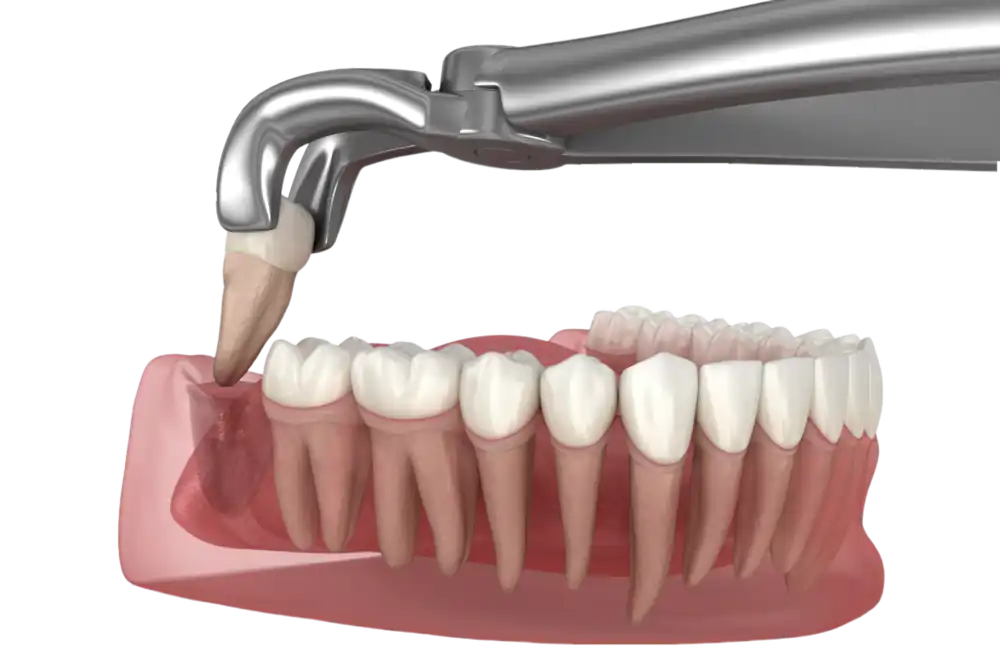You’ve been told you need your wisdom teeth remove — and before you panic about pain, you’re wondering how much it’s going to cost. Fair. It’s one of those things that sounds both medical and expensive. But the truth? It depends — on a lot of things, actually.
This guide walks through what really drives the price — whether you’re paying out of pocket or trying to decode your insurance coverage. We’ll look at regional averages, the difference between a simple extraction and a surgical one, what’s usually included, and how to get it done without losing your mind (or your paycheck). Whether it’s just one tooth or all four, and whether you’re insured or not, you’ll leave here with a clearer picture of the numbers — and maybe a little less dread about the whole thing.
Understanding the True Cost Behind Wisdom Teeth Removal
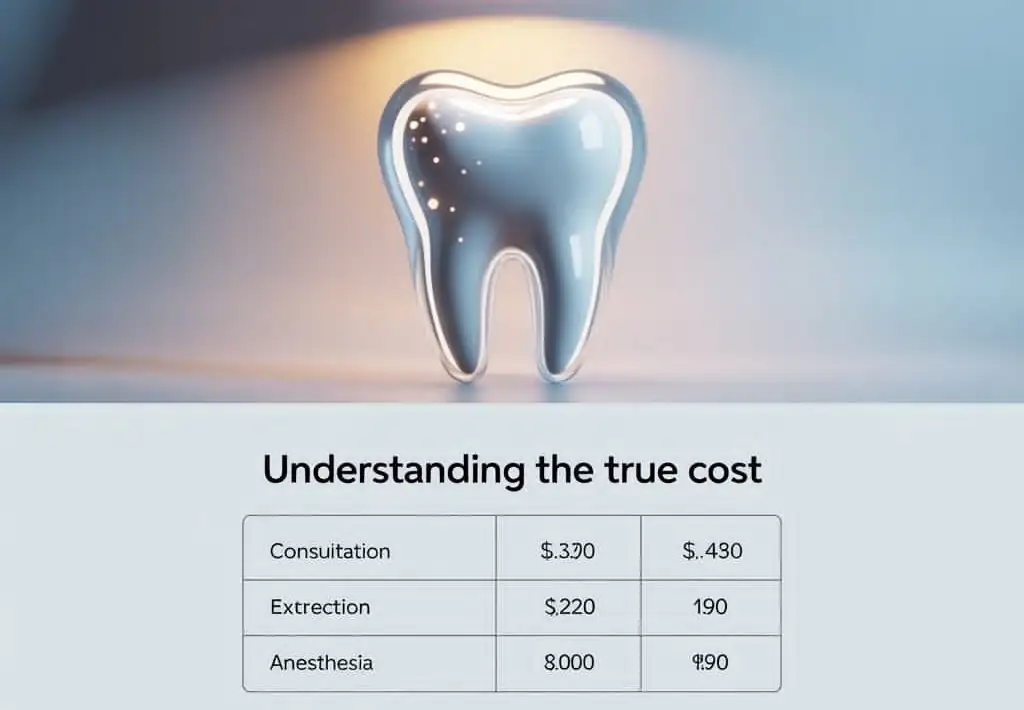
At first glance, “How much does it cost to remove wisdom teeth?” feels like a simple question. But the real answer depends on a mix of factors — medical, geographical, and financial. It’s not just the pulling of a tooth. You’re paying for oral surgery, dental imaging, anesthesia, and post-op care — all of which add up.
Whether you’re dealing with one painful molar or all four impacted teeth, the price tag reflects more than just the dental procedure. The cost can range from a few hundred to a few thousand dollars based on how complex your case is and what type of provider you choose (a general dentist vs. a dental specialist or oral surgeon).
Let’s break down what influences the price right out of the gate:
- Type of Extraction: Is the tooth fully erupted or stuck under bone? This determines if you need a simple or surgical removal.
- Sedation Choices: Going with local anesthesia is the cheapest, but if you want IV sedation or general anesthesia, expect a few hundred dollars more.
- Location: Dental care in rural Ohio will cost a lot less than in downtown Los Angeles or San Francisco.
- Insurance vs. Out-of-Pocket: If you’re covered by dental insurance or have a Flexible Spending Account (FSA) or Health Savings Account (HSA), your out-of-pocket costs can drop significantly.
Pro Tip: Always ask your provider if they offer bundled pricing. A flat fee that covers everything — from X-rays to follow-ups — can help you avoid surprise charges and make smarter budgeting decisions.
I. Why Wisdom Teeth Removal Is So Common
So here’s the deal: wisdom teeth, or “third molars” if we’re being technical, are late bloomers. They usually show up between the ages of 17 and 25 — just when you think your teeth situation is settled. And while some people live their whole lives without an issue, many of us… don’t.
The biggest troublemakers are the impacted wisdom teeth — the ones that never fully break through the gums. They might be angled wrong, pushing into other teeth, or just stuck in the bone. Dentists call it impaction. You might call it constant jaw pain or the reason your cheeks are swelling up like a chipmunk.
These molars often don’t have enough room to grow properly. So they crowd the others, trap food, cause decay, or just sit awkwardly in your jaw like they’re waiting for an invitation to do damage. That’s why oral surgeons usually recommend getting them out before they cause full-blown dental issues.
Some extractions are a breeze. Others? Not so much. That’s where the cost differences start — but we’ll get into that soon.
II. Types of Wisdom Tooth Extractions (And Why Costs Vary)
Let’s talk extractions — because not all are created equal.
Some wisdom teeth pop out like a loose puzzle piece. Others? They’re lodged deep, sideways, tangled in bone or stuck under the gums. That difference — simple vs. surgical — is one of the biggest factors behind the cost of wisdom teeth removal.
Here’s a quick breakdown:
| Type of Extraction | Avg. Cost (Without Insurance) | What You’re Dealing With |
| Simple Extraction | $75–$300 per tooth | Fully erupted tooth, no gum or bone cutting needed |
| Surgical Extraction | $225–$600 per tooth | Impacted teeth, requires cutting bone/gum, sedation |
A simple extraction might be done right in the dentist’s chair with local anesthetic — a little numbing, maybe some pressure, and you’re out the door.
But a surgical extraction? That’s usually in the domain of a dental specialist like an oral surgeon, especially if there’s bone tissue involved or the root development is close to nerves. Add IV sedation or general anesthesia to the mix, and the price can climb fast.
Pro Tip: If only one or two wisdom teeth are causing problems, ask your dental professional whether the others can be left alone — or if removing all four at once might save on sedation options and reduce the overall cost estimate.
III. Average Cost to Remove Wisdom Teeth (USA)
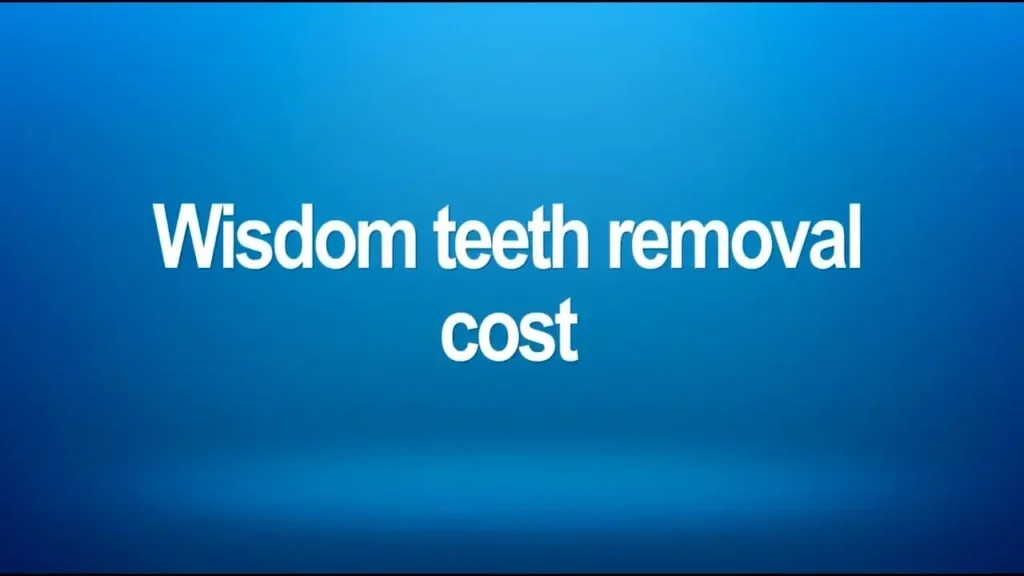
So, how much does it really cost to remove wisdom teeth in the U.S.? Honestly — it’s a range. A wide one.
Here’s the national ballpark, assuming you’re not using dental insurance:
- One simple tooth extraction: $75–$300
- One surgical extraction (impacted): $225–$600
- All four removed (mix of types, with IV sedation): $1,000–$3,000
- With general anesthesia and full bony impaction: closer to $3,500+
Of course, geography plays a role. A wisdom teeth removal in Charlotte, NC or Land O’ Lakes, FL might be a few hundred less than the same oral surgery in San Francisco or New York.
Here’s a quick regional snapshot:
| Region | Typical 4-Tooth Extraction Range |
| Northeast (e.g., NH, NY) | $1,500–$3,000 |
| South (e.g., NC, FL) | $1,200–$2,500 |
| West Coast (e.g., CA, WA) | $1,800–$3,500 |
| Midwest (e.g., OH, MI) | $1,000–$2,400 |
And just to paint a clearer picture, let’s say:
You’re 22 years old, your wisdom teeth are partially impacted, and you need all four out. You go with IV sedation. The oral surgeon quotes you $2,100. That includes the initial consultation, dental X-rays, the extractions, and follow-up care. Not cheap — but not out of the norm either.
Still uninsured? Here’s the truth: You’ll likely pay somewhere between $250 and $750 per tooth, depending on how complex the dental procedure is. Some clinics offer interest-free financing, and if you’ve got a Health Savings Account (HSA) or Flexible Spending Account (FSA), that can help too.
IV. What’s Included in the Wisdom Tooth Removal Fee?
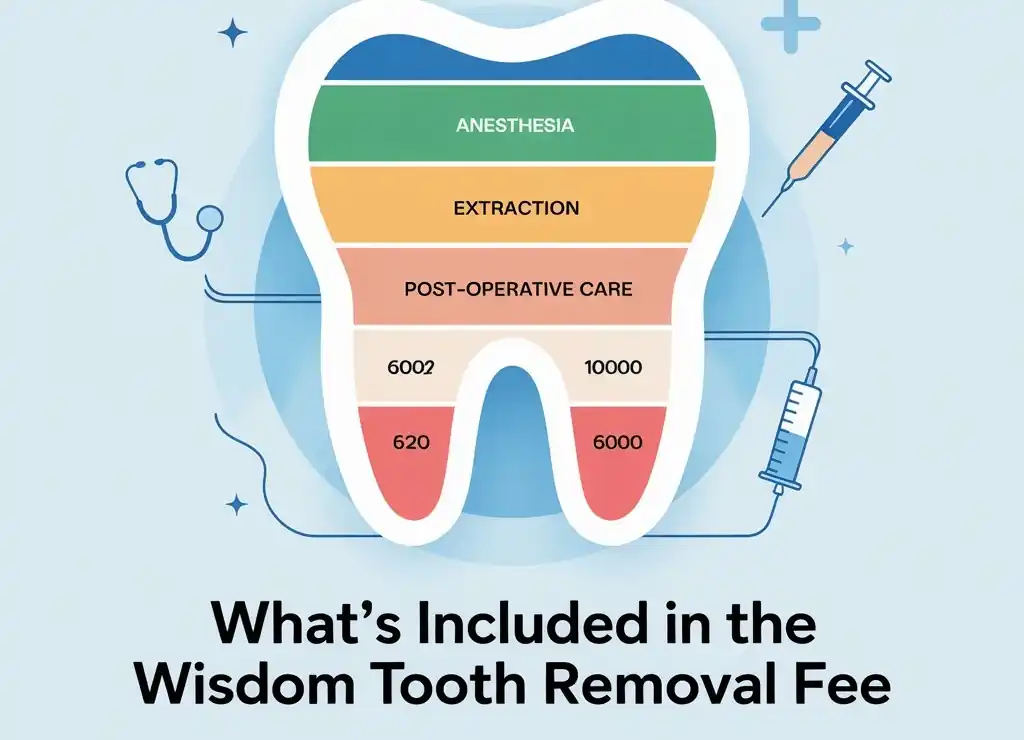
Here’s something people don’t always realize: when you ask “how much does it cost to remove wisdom teeth?”, you’re not just paying for the yank. You’re paying for a bundle of services — some necessary, some… well, optional, depending on your case and provider.
Here’s what might be included in your final bill:
- Initial Consultation: Sometimes free, sometimes $50–$200. Think of it as your meet-and-greet with the oral surgeon or dental professional.
- Dental Exam and Imaging: This includes digital X-rays, or sometimes more advanced imaging like 3D cone-beam CT scanners, especially if the roots are close to nerves. Expect $85–$300 depending on the tech used.
- Anesthesia/Sedation: Local numbing might be included, but IV sedation, oral sedation, or general anesthesia will tack on hundreds.
- The Actual Extraction: Yep — that’s the main event. Whether it’s a simple extraction or a surgical extraction, this is usually the highest line item.
- Post-Op Medications: Antibiotics, pain meds — some surgeons include these, some send you to the pharmacy.
- Follow-Up Visit(s): Usually 1–2 are included. Just to make sure you’re healing well and not developing a dreaded dry socket.
It’s kind of like booking a flight — your seat might look affordable, but suddenly you’re adding bags, meals, Wi-Fi…
Pro Tip: Before you agree to anything, ask for a full cost breakdown. A clear cost estimate can help you plan ahead — or negotiate a flat rate. Many dental practices offer “all-in-one” quotes, especially for Wisdom Teeth Extraction with sedation options and imaging bundled together.
Also, if you’re dealing with a dental specialist or a place like McNally Brothers Oral Surgery or Lehigh Valley Oral Surgery & Implant Center, pricing may be a bit higher — but you’re likely getting more personalized care and advanced tools.
V. How Insurance Affects Wisdom Teeth Removal Costs
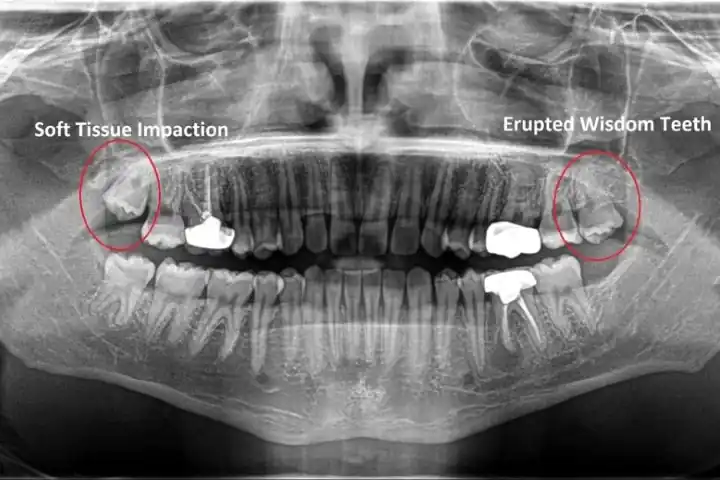
Okay, so let’s talk dental insurance. The kind of coverage you have (or don’t have) can drastically swing what you pay out of pocket.
Most dental insurance plans (like Delta Dental, Cigna Healthcare, or others) will cover part or all of the tooth extraction if it’s considered medically necessary. But — and this is a big but — “necessary” varies.
Here’s how it typically plays out:
- Medically necessary extractions (impacted teeth, infection, cysts): usually 50%–80% covered
- Non-urgent or preventative extractions: might only be partially covered, or not at all
- Annual limits: Most plans have a yearly cap — like $1,000–$1,500 total
- Deductibles and Copays: Expect to cover some portion yourself, even with insurance
- Waiting Periods: If you just got your insurance, they might not cover major oral surgery for 6–12 months
Now, if you’re uninsured or your plan doesn’t offer much, don’t panic yet. That brings us to…
Dental Discount Plans vs. Traditional Insurance
Dental discount plans are different animals. They’re not insurance exactly — they’re more like club memberships that give you pre-negotiated lower fees.
Here’s a quick comparison:
| Dental Insurance | Dental Discount Plan | |
| Premiums | Monthly (often $20–$50) | Annual (usually $100–$200) |
| Coverage | % of costs (up to a yearly max) | Flat discounts (15%–60%) |
| Waiting Periods | Often 6–12 months | Usually none |
| Flexibility | Limited network providers | Wider provider choice |
| Good for? | Frequent dental work users | Budget-conscious or uninsured |
A lot of families juggling financial planning find that using a Flexible Spending Account (FSA) or Health Savings Account (HSA) makes covering wisdom teeth extraction a lot easier — and more tax-friendly.
VI. Factors That Can Affect the Final Cost

So, maybe you’re thinking — how can the same procedure cost one person $400 and someone else $2,400? Turns out, there’s a long list of invisible stuff baked into every cost estimate. Some of it makes perfect sense once it’s laid out.
Here’s what impacts the cost of wisdom teeth removal more than you’d expect:
- Number of Teeth Removed
One? Less cost. All four? Expect a bundle fee, often with a discount per tooth. - Extraction Complexity
Is it a simple extraction, or are the impacted teeth twisted sideways and sitting against nerves? Things like full bony impaction or awkward root development drive up the price — and require a more experienced oral surgeon. - Type of Anesthesia
Local anesthetic is usually included. But add oral sedatives, IV sedation, or general anesthesia, and you’re looking at hundreds more. (We’ll dig deeper into that in the next section.) - Location
Yes, where you live matters. Wisdom tooth removal in a high-cost area like San Francisco or Boston will cost significantly more than in parts of New Hampshire or the Midwest. Some patients even consider dental tourism (more on that later). - Experience of the Provider
A dental school may offer steeply discounted rates, but it’s usually students under supervision. A seasoned dental specialist like D. Cameron Braasch, DMD will cost more — but bring advanced skill and tools, like 3D cone-beam CT scanners for safer planning. - Additional Services
Things like bone grafts, pre-surgery consultations, or oral surgery aftercare kits (ice packs, rinses, gauze, etc.) might sneak onto your bill. - Health Conditions or Risks
If you have a bleeding disorder, a heart condition, or you’re on medication that complicates sedation, the team might need extra staff, tools, or hospital coordination — and that means higher fees.
Pro Tip: If your oral surgeon doesn’t mention it, ask what kind of extraction you’re getting — and whether it counts as “simple,” “complex,” or “surgical.” It matters for insurance coverage, your wallet, and your post-op experience.
VII. Cost by Sedation Type
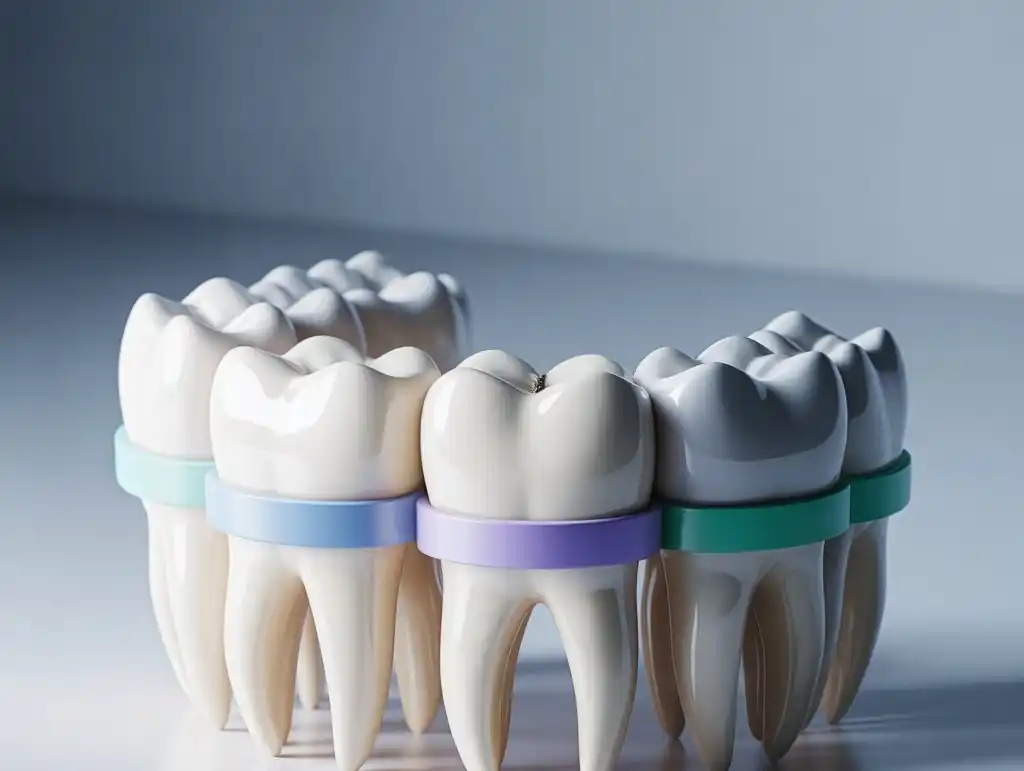
Pain isn’t one-size-fits-all. And neither is anesthesia. The right sedation option for your wisdom tooth extraction depends on your pain tolerance, anxiety level, and the complexity of the procedure.
Let’s break it down by type — from cheapest to most expensive:
| Sedation Type | Average Added Cost | Details |
| Local Anesthetic | Usually Included | Numbs just the extraction area. You’re fully awake. |
| Nitrous Oxide (“Laughing Gas”) | $50–$100 | Light sedation, wears off quickly. Great for mild anxiety. |
| IV Sedation | $250–$500 | You’re conscious but very drowsy. Most popular for 4-tooth removals. |
| General Anesthesia | $300–$700+ | You’re fully asleep. Reserved for extreme cases or high anxiety. |
Some dental practices offer oral sedation (a pill, like Halcion or Valium), which usually costs less than IV or general and is suitable for moderately complex cases. It’s often bundled into a sedation package, especially if you’re getting all four wisdom teeth out at once.
So… can you choose a cheaper option?
Yes — but only if your case allows it. If the tooth extraction is routine and you’re not overly nervous, local anesthetic or nitrous oxide may be just fine. But for anything that involves bone tissue removal, awkward gum tissue positioning, or deeply impacted wisdom teeth, most surgeons will recommend IV sedation for your safety and comfort.
Real Talk: It’s okay to want to be “out cold” — but know that general anesthesia requires more staff, possibly hospital time, and can double your cost. Always weigh your anxiety level vs. financial comfort.
VIII. Does Medicaid or Medicare Cover Wisdom Teeth Removal?
If you’re relying on public health insurance like Medicaid or Medicare, the story around wisdom teeth removal costs gets… trickier. There are rules. Exceptions. And a lot of fine print.

Let’s break it down:
🏥 Medicaid
- Coverage varies by state — Some states cover tooth extractions under Medicaid for adults, others don’t. Children under 21 usually get more comprehensive dental coverage.
- Must be medically necessary — The term medically necessary shows up a lot here. If your impacted wisdom teeth are infected, causing pain, or damaging surrounding gum tissue or bone tissue, you’ve got a better shot at coverage.
- Documentation matters — X-rays, dental exams, and a written referral from a dental professional (often a general dentist) may be required to prove the need.
🧓 Medicare
- Generally does not cover dental services, including wisdom tooth extraction — unless they’re tied to another medical procedure.
- Medicare Advantage Plans (Part C) might offer dental benefits, including oral surgery, depending on the plan provider. Read the fine print or call them.
Pro Tip: Don’t assume you’re out of luck — some hospital indemnity plans and state-sponsored programs may help if the extraction is tied to another health issue (like infections or complications during Cancer Treatment). Always ask your provider.
IX. How to Lower the Cost of Wisdom Tooth Extraction
Let’s be honest: the cost of wisdom teeth removal can hit hard, especially if you’re uninsured or underinsured. But here’s the thing — with some smart planning, you can shave hundreds (sometimes thousands) off the bill.
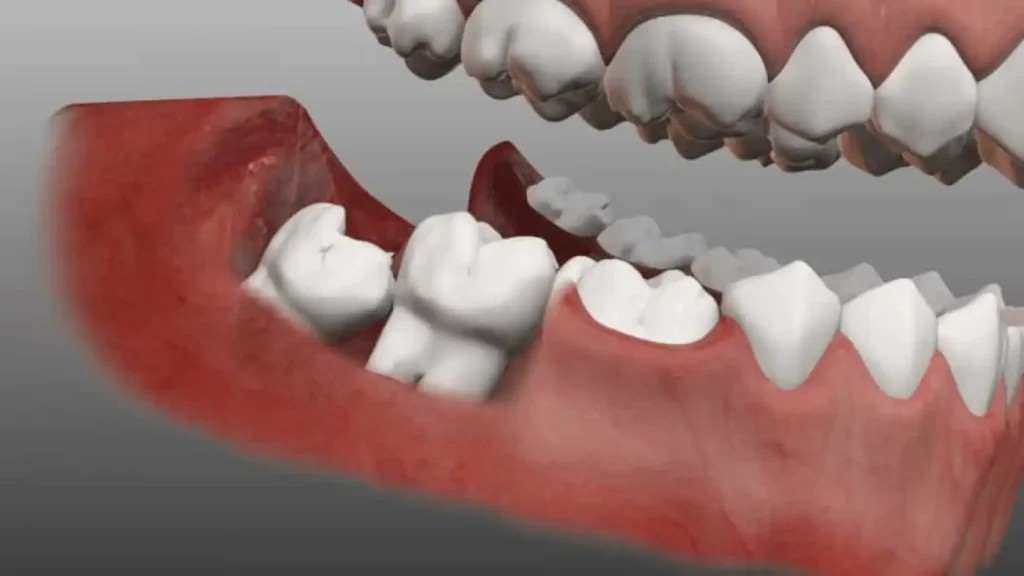
Here are some real, actionable ways to make it more affordable:
🏫 1. Visit a Dental School
Students (closely supervised by professionals) perform oral surgery at significantly reduced rates. It might take longer, but you could save 40–60%.
🌆 2. Compare Providers by Location
A clinic in the suburbs or a smaller town can charge hundreds less than one in a downtown metro area. For example, Land O’ Lakes, FL, might offer a better deal than downtown Miami.
💰 3. Ask for a Bundled Quote
Some providers offer a flat rate that includes consultation, X-rays, anesthesia, and post-op care. This can simplify your financial planning and prevent surprise add-ons.
💳 4. Use Interest-Free Financing
Many dental practices partner with companies like CareCredit or offer in-house payment plans. You might be able to split the total into 6–24 monthly payments — sometimes with 0% interest.
💡 5. Check for Promotions or Cash Discounts
Some clinics offer seasonal promos, especially for college students. Others offer 5–10% off if you pay cash upfront — avoiding credit card fees helps them too.
| Saving Strategy | Potential Savings | Where to Ask |
| Dental school extraction | 40–60% off | Local dental universities |
| Urban vs. suburban providers | $200–$800 difference | Price shop within a 30–60 min radius |
| Cash payment discount | 5–10% off | Private practices |
| In-house financing | Flexible monthly payments | Dental chains or family-owned clinics |
| Insurance + FSA/HSA combo | Up to full cost coverage | If medically necessary and pre-planned |
Pro Tip: Even if you don’t have insurance, bringing in your dental X-rays from a previous provider can sometimes knock off $100–$200 from your consultation costs.
X. International Costs: Dental Tourism for Wisdom Teeth
When people start googling “how much does it cost to remove wisdom teeth?”, they sometimes stumble across something unexpected: dental tourism. And honestly, if you’re uninsured in the U.S., it might sound tempting. But — is it safe? Smart? Affordable? Let’s explore that.
Here’s how the numbers stack up:
| Country | Avg. Cost (All 4 Wisdom Teeth) | Popular Cities for Dental Tourism |
| Mexico | $500–$1,200 | Tijuana, Cancun, Los Algodones |
| Thailand | $600–$1,500 | Bangkok, Phuket |
| Turkey | $700–$1,600 | Istanbul, Antalya |
| Colombia | $450–$1,100 | Medellín, Bogotá |
Now compare that to U.S. costs, which can easily climb to $2,000–$3,500 with IV sedation or general anesthesia, especially for surgical extractions.
But while the price tag is enticing, it’s not just about the bill.
Pros:
- Major cost savings — up to 70%
- Many clinics use minimally invasive techniques
- Combine the trip with a vacation (if you’re up for it)
Cons:
- Post-op complications can’t be handled locally
- Travel costs add up (flights, hotel, recovery time)
- Language barriers or regulatory differences
- Tough to schedule follow-up visits or emergency care
Pro Tip: If you’re serious about wisdom tooth removal abroad, look for providers with accreditation from international boards or U.S.-trained staff. And definitely factor in travel risks — flying with swollen cheeks isn’t exactly a great souvenir.
So — should you do it? Maybe, if you’re young, healthy, uninsured, and willing to accept some risk for the savings. But if you’ve got complex impactions, underlying conditions, or anxiety about medical travel? It’s probably safer to find a solid dental practice closer to home.
XI. What to Ask Your Oral Surgeon Before Booking
Let’s say you’ve got a consultation scheduled. That first meeting can feel like a blur if you’re not sure what to ask. But the right questions can save you money, confusion — and possibly a surprise dry socket situation later.
Here’s a list to keep in your notes app or pocket:
- Will I need a simple or surgical extraction?
Knowing the level of complexity helps estimate the cost of wisdom teeth removal — and whether you’ll need sedation. - What type of sedation is best for my case?
Do you really need IV sedation, or would oral sedatives be enough? - Are imaging and consultations included in the price?
Ask whether dental X-rays or CT scans are separate. - Will all four wisdom teeth be removed at once?
Sometimes, removing all four at once (especially if they’re impacted teeth) saves money and healing time. - What if there are complications, like nerve contact or infection?
Will that affect cost? Will a dental specialist be brought in? - Is post-operative care included?
Some providers include aftercare kits, prescriptions, or a follow-up visit — others charge separately. - What payment options are available?
Are there interest-free financing options? Can you use your FSA, HSA, or a Dental Discount Plan? - What’s the timeline for recovery?
Understanding your post-operative instructions ahead of time helps with work or school planning.
Mentioning providers like Greater Modesto Dental Implant & Oral Surgery Center, Springhill Dental Center, or Manchester Oral Surgery can also give you a sense of what top-tier practices include — especially if you’re comparing cost of living between regions.
Pro Tip: If you’re torn between two providers, ask both for a written quote that breaks down each element — from sedation to gum tissue removal to imaging. Apples-to-apples comparisons are the only way to know what you’re really paying for.
XII. Real Patient Examples
Sometimes the best way to understand the cost of something — especially something as unpredictable as wisdom teeth removal — is to hear what real people actually paid. Of course, everyone’s situation is different, but these examples can help set expectations and show how much extraction complexity, sedation options, and insurance status can impact the final bill.
| Patient Case | Details | Total Cost |
| 19-year-old student, 4 impacted teeth, IV sedation | Full surgical extraction, no insurance, needed post-op meds | $2,100 |
| 24-year-old with 1 erupted wisdom tooth | Done with local anesthetic in general dental practice | $175 |
| 30-year-old at dental school clinic | 2 partially erupted third molars, oral sedation, slow but effective | $500 total |
| Parent using Delta Dental plan | Full extraction covered 80% after deductible, co-pay $400 | Approx. $800 total |
| Uninsured freelancer, removed all 4 at once in Mexico | Traveled for dental tourism, included hotel/transport, basic aftercare | $1,250 (all in) |
These aren’t outliers — they’re pretty representative of what you might run into depending on your choices and situation. Whether you go through a high-end oral surgeon or try a teaching hospital, the cost landscape changes.
Pro Tip: If you’re on a budget, combining lower-cost options (like a dental school + basic oral sedation) could cut your total by more than half — without compromising safety. Just be ready for a longer appointment.
XIII. What Happens If You Don’t Remove Wisdom Teeth?
The Cost of Waiting
It’s tempting to delay. Maybe they don’t hurt yet, or you’re hoping they’ll just… behave. But skipping or postponing a necessary wisdom teeth extraction can backfire — sometimes in painful (and expensive) ways.
Here’s what might happen if those third molars are left to their own devices:
😬 Infection
Trapped food and bacteria around partially erupted teeth can lead to pericoronitis — a painful infection under the gums that often ends with emergency oral surgery.
🦷 Damage to Adjacent Teeth
Crowded impacted teeth can push into your molars, shifting your bite or even damaging the roots of otherwise healthy teeth.
💥 Cyst or Tumor Development
This one’s rare, but serious. Cysts can form around an impacted wisdom tooth, sometimes damaging jawbone or nearby nerves. That means more complex treatment and possible bone grafts later on.
💸 Emergency Removal = Higher Cost
A last-minute extraction usually isn’t done by your friendly local dentist. You’re probably looking at an oral surgeon, urgent imaging like CT scans, possible IV sedation, and a bigger final bill.
😷 Dry Socket Risk
If a delayed extraction ends up being more invasive (e.g., full bone tissue removal), your risk of dry socket increases — and that means longer healing, more pain, and more follow-ups.
So while the upfront cost of removing wisdom teeth might sting a little, the long-term consequences of waiting? They’re often worse — for your health and your wallet.
Pro Tip: Not all wisdom teeth need to be removed. But a proper dental exam, possibly with digital X-rays or a panoramic scan, is the only way to know for sure. Ask your dentist, don’t guess.
Final Words
After all the estimates and what-ifs, you might still be wondering: How much does wisdom teeth removal cost, and is it worth it?
While the price tag can seem steep, removing wisdom teeth prevents painful complications like infections or impacted teeth that could lead to costly surgeries later on. It’s also easier to recover if done between ages 17-25. For many, the cost is less than an emergency procedure down the road, and dental insurance may cover part of it.
However, costs can exceed $2,000 without insurance, and expenses vary based on location and complexity. Despite the expense, many patients find that the peace of mind and relief from pain make it all worth it in the end.
Pro Tip: Don’t just ask “how much does it cost to remove wisdom teeth?” — ask, “What am I saving myself from by doing this now?” That’s often the better question.
💬 Frequently Asked Questions
1. What’s the average cost of removing 4 wisdom teeth?
Without insurance? Somewhere between $1,200–$3,000, depending on your sedation options, provider, and if the teeth are impacted. With insurance, you might pay $300–$800 out of pocket.
2. How much is wisdom teeth removal with insurance?
ost dental insurance plans (like Cigna Healthcare or Delta Dental) cover 50–80% if the procedure is deemed medically necessary. Just watch out for annual limits and deductibles.
3. Can I get them removed for free?
Only in rare cases. If you’re under 21 and on Medicaid, or attending a dental school clinic, you might qualify for free or very low-cost care. Otherwise, not likely.
4. Is IV sedation worth the cost?
For many, yes — especially if you’re getting all 4 out or have high anxiety. But if it’s a simple extraction, oral sedation or local anesthetic may be enough.
5. Why does impaction increase the price?
Because it’s more complicated. Impacted wisdom teeth may be under the gum tissue or bone tissue, and need surgical tools, more time, and often 3D imaging. That means higher fees.
6. Does dental school extraction hurt more?
Not really. Students work under expert supervision. The process just takes longer, and you may not get fancy amenities. It’s safe — just bring some extra patience.
7. What happens if I don’t remove my wisdom teeth?
They might never cause problems… or they might crowd your smile, develop cysts, or cause pain and infection. Then it becomes an emergency — and more expensive.
8. Can I pay for the extraction in installments?
Yes! Many dental practices offer payment plans, some with interest-free financing. You can also use Flexible Spending Accounts (FSA) or Health Savings Accounts (HSA) to help.
9. How much does wisdom teeth removal cost in Mexico?
Usually around $500–$1,200 for all four — even with IV sedation and aftercare. But don’t forget to factor in travel, lodging, and follow-ups.
10. Is it cheaper to remove all 4 wisdom teeth at once?
Yes — especially when it comes to sedation and recovery time. Most oral surgeons recommend doing them together if possible. It’s more efficient, less stressful, and usually less expensive per tooth.

